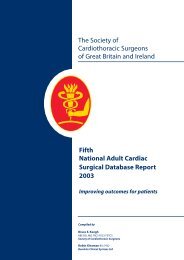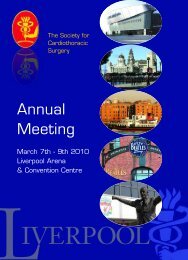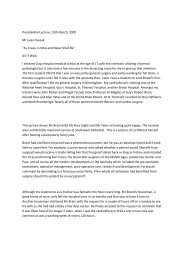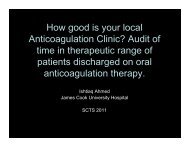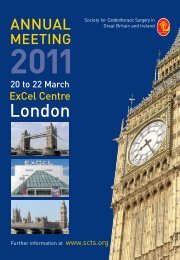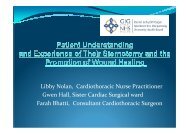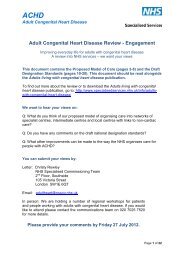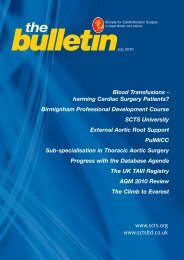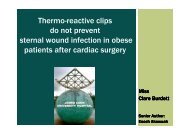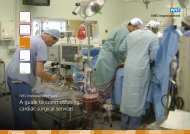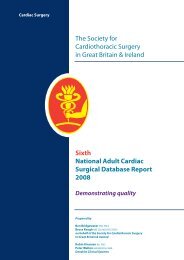Download - Society for Cardiothoracic Surgery
Download - Society for Cardiothoracic Surgery
Download - Society for Cardiothoracic Surgery
Create successful ePaper yourself
Turn your PDF publications into a flip-book with our unique Google optimized e-Paper software.
2 theBulletin<br />
December 2011<br />
Report from<br />
The President<br />
Dear colleagues<br />
I find it almost impossible to believe that I have now almost<br />
completed my two year office as President demitting to James<br />
Roxburgh at the next annual meeting.<br />
Over this period I have been privileged to be President during<br />
the publication of the Professionalism book and more recently,<br />
publication of the Thoracic Blue book. This very important<br />
publication has already been brought to the attention of the<br />
Health Minister and points out the increasing number of lung<br />
cancer resection operations, the decreasing mortality associated<br />
with this and the potential number of lives saved as a<br />
consequence of this surgery. Indeed the best estimates are that<br />
<strong>for</strong> every person who dies as a result of lung resection <strong>for</strong> cancer<br />
there are an additional 35 survivors. However, more still needs to<br />
be done as there are still substantial inequalities across the UK<br />
and perhaps there should be a further drive to increase the<br />
number done through video-assisted procedures.<br />
The safe and sustainable issue has continued to cause division<br />
within both the Executive and our membership. While SCTS<br />
supported the principle of the review it had much less<br />
involvement in the process and perhaps in retrospect this was an<br />
error. Certainly in terms of the reconfiguration of GUCH Services<br />
SCTS would aim to be more involved.<br />
From an adult cardiac prospective we are<br />
potentially in the best situation we have<br />
been <strong>for</strong> the last two decades with<br />
considerably mounting evidence of the<br />
benefits of CABG over stents<br />
From an adult cardiac prospective we are potentially in the best<br />
situation we have been <strong>for</strong> the last two decades with<br />
considerably mounting evidence of the benefits of CABG over<br />
stents as illustrated in the 4 year outcomes of SYNTAX Trial<br />
(showing a strong survival advantage <strong>for</strong> CABG <strong>for</strong> almost 80%<br />
of 3 vessel disease and 2/3 of left main stem disease). Of course<br />
the cardiac surgical community has been arguing this very point<br />
over the last decade so it is reassuring to see it confirmed in a<br />
large randomized trial. In the early summer the dogged<br />
persistence of the Executive, accompanied by the outstanding<br />
ef<strong>for</strong>ts of our irreplaceable late patient representative David<br />
Geldard (see obituary in this issue), finally convinced NICE to<br />
over turn their initial proposal which effectively would have<br />
allowed/encouraged interventional cardiologists to take on any<br />
severity of coronary artery disease if they alone considered the<br />
anatomy suitable and without any reference to the surgical<br />
opinion. Not only was this potential recommendation completely<br />
at odds with the ESC/EACTS guidelines but it would have been<br />
of major detrimental value both to the safety of patients and to<br />
the future of cardiac surgery. However there is much more work<br />
Professor D P Taggart,<br />
MD, PhD, FRCS<br />
to be done and particularly in trying<br />
to persuade commissioners that<br />
they should not fund any<br />
intervention that does not follow<br />
approved guidelines or has<br />
otherwise been discussed by an<br />
MDT to explain why an alternative<br />
strategy is being pursued. I was<br />
particularly concerned that <strong>for</strong> a<br />
<strong>Society</strong>, who considers itself to be<br />
held in such high regard by external<br />
parties, we were almost brushed aside by NICE.<br />
Another issue is the continued ongoing scrutiny of results which<br />
has, I believe, at least <strong>for</strong> now, reached “a natural limit”. There is<br />
little evidence of the majority of the medical profession being<br />
persuaded to follow us and it really is now time to allow others<br />
to catch up. While transparency in results is clearly important<br />
and fundamental (just as I want the right to know my MP’s<br />
expense claims) the current <strong>for</strong>mat of publication inevitably<br />
encourages risk averse behaviour. I would personally favour a<br />
system that basically judges per<strong>for</strong>mance on standard/low risk<br />
patients with everything else deemed ‘high risk’.<br />
Equally so, I remain very concerned that cardiac surgical units<br />
operate in potentially increasing hostile environments where it is<br />
all too easy to hold the surgeon accountable <strong>for</strong> poor outcomes<br />
even when systems failures may have contributed. Indeed, SCTS<br />
is currently drawing up a document “Safe <strong>Surgery</strong>” under the<br />
chairmanship of Prof Marjan Jahangiri, and this should hopefully<br />
define minimum standards of what is safe surgery in terms of<br />
personnel, equipment and working environment.<br />
You will all be aware by now of the slight increase in annual fees<br />
and this is absolutely necessary to keep our books balanced and<br />
to prevent the <strong>Society</strong> from running into persistent deficits.<br />
However, if you consider the true added value of SCTS e.g. in<br />
terms of SCTS annual meeting and university, the small increase<br />
in fees is not punitive or with out added value. On a very positive<br />
note our next meeting, <strong>for</strong> the first time, is being held in<br />
conjunction with ACTA and, if as likely, proves a successful event<br />
may become a regular ‘fixture’. This is a particularly important<br />
initiative because increasingly cardiac surgeons and cardiac<br />
anaesthetists face similar problems. Consequently I would be<br />
grateful if you could make every ef<strong>for</strong>t to reduce activity as much<br />
as possible <strong>for</strong> that period to give consultants and trainees and<br />
allied staff every possible opportunity to attend.<br />
Finally, I would like to thank all the members of the Executive <strong>for</strong><br />
the great work that they consistently do and would encourage all<br />
members of the <strong>Society</strong> to seek to be as actively involved as<br />
possible.<br />
Wishing you all the best <strong>for</strong> the festive period!<br />
David Taggart<br />
President



